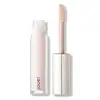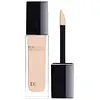What's inside
What's inside
 Key Ingredients
Key Ingredients

 Benefits
Benefits

 Concerns
Concerns

 Ingredients Side-by-side
Ingredients Side-by-side

Cyclopentasiloxane
EmollientWater
Skin ConditioningButylene Glycol
HumectantPvp
Emulsion StabilisingPhenyl Trimethicone
Skin ConditioningCetyl PEG/PPG-10/1 Dimethicone
EmulsifyingPEG-10 Dimethicone
Skin ConditioningVinyl Dimethicone/Methicone Silsesquioxane Crosspolymer
Quaternium-18 Hectorite
Sorbitan Isostearate
EmulsifyingDimethicone
EmollientSodium Chloride
MaskingTriethoxycaprylylsilane
Caprylyl Glycol
EmollientPhenoxyethanol
PreservativeCitric Acid
BufferingSorbitol
Humectant1,2-Hexanediol
Skin ConditioningPropanediol
SolventSodium Phytate
Illicium Verum Fruit Extract
PerfumingTocopheryl Acetate
AntioxidantSodium Hyaluronate
HumectantEuterpe Oleracea Fruit Extract
CI 77891
Cosmetic ColorantCI 77491
Cosmetic ColorantCI 77492
Cosmetic ColorantCI 77499
Cosmetic ColorantCyclopentasiloxane, Water, Butylene Glycol, Pvp, Phenyl Trimethicone, Cetyl PEG/PPG-10/1 Dimethicone, PEG-10 Dimethicone, Vinyl Dimethicone/Methicone Silsesquioxane Crosspolymer, Quaternium-18 Hectorite, Sorbitan Isostearate, Dimethicone, Sodium Chloride, Triethoxycaprylylsilane, Caprylyl Glycol, Phenoxyethanol, Citric Acid, Sorbitol, 1,2-Hexanediol, Propanediol, Sodium Phytate, Illicium Verum Fruit Extract, Tocopheryl Acetate, Sodium Hyaluronate, Euterpe Oleracea Fruit Extract, CI 77891, CI 77491, CI 77492, CI 77499
Water
Skin ConditioningC9-12 Alkane
SolventCaprylic/Capric Triglyceride
MaskingPropanediol
SolventGlycerin
HumectantPolyglyceryl-6 Polyricinoleate
EmulsifyingDicaprylyl Ether
EmollientPentylene Glycol
Skin ConditioningSilica
AbrasivePolyglyceryl-10 Decaisostearate
EmollientSynthetic Fluorphlogopite
Trimethylsiloxysilicate
EmollientIris Florentina Root Extract
MaskingPolyglyceryl-2 Isostearate
EmulsifyingDisteardimonium Hectorite
StabilisingSodium Myristoyl Glutamate
CleansingStearalkonium Hectorite
Gel FormingSodium Chloride
MaskingButylene Glycol
HumectantLecithin
EmollientHydroxyacetophenone
AntioxidantSodium Benzoate
MaskingPropylene Carbonate
SolventPolyhydroxystearic Acid
EmulsifyingHydrolyzed Viola Tricolor Extract
Skin ProtectingAluminum Hydroxide
EmollientParfum
MaskingTocopherol
AntioxidantIsostearic Acid
Cleansing1,2-Hexanediol
Skin ConditioningCaprylyl Glycol
EmollientPolyglyceryl-3 Polyricinoleate
EmulsifyingAchillea Millefolium Extract
CleansingXanthan Gum
EmulsifyingTropaeolum Majus Flower/Leaf/Stem Extract
Skin ConditioningCitric Acid
BufferingPotassium Sorbate
PreservativeCI 77891
Cosmetic ColorantCI 77491
Cosmetic ColorantCI 77492
Cosmetic ColorantCI 77499
Cosmetic ColorantWater, C9-12 Alkane, Caprylic/Capric Triglyceride, Propanediol, Glycerin, Polyglyceryl-6 Polyricinoleate, Dicaprylyl Ether, Pentylene Glycol, Silica, Polyglyceryl-10 Decaisostearate, Synthetic Fluorphlogopite, Trimethylsiloxysilicate, Iris Florentina Root Extract, Polyglyceryl-2 Isostearate, Disteardimonium Hectorite, Sodium Myristoyl Glutamate, Stearalkonium Hectorite, Sodium Chloride, Butylene Glycol, Lecithin, Hydroxyacetophenone, Sodium Benzoate, Propylene Carbonate, Polyhydroxystearic Acid, Hydrolyzed Viola Tricolor Extract, Aluminum Hydroxide, Parfum, Tocopherol, Isostearic Acid, 1,2-Hexanediol, Caprylyl Glycol, Polyglyceryl-3 Polyricinoleate, Achillea Millefolium Extract, Xanthan Gum, Tropaeolum Majus Flower/Leaf/Stem Extract, Citric Acid, Potassium Sorbate, CI 77891, CI 77491, CI 77492, CI 77499
 Reviews
Reviews

Ingredients Explained
These ingredients are found in both products.
Ingredients higher up in an ingredient list are typically present in a larger amount.
1,2-Hexanediol is a synthetic liquid and another multi-functional powerhouse.
It is a:
- Humectant, drawing moisture into the skin
- Emollient, helping to soften skin
- Solvent, dispersing and stabilizing formulas
- Preservative booster, enhancing the antimicrobial activity of other preservatives
Butylene Glycol (or BG) is used within cosmetic products for a few different reasons:
Overall, Butylene Glycol is a safe and well-rounded ingredient that works well with other ingredients.
Though this ingredient works well with most skin types, some people with sensitive skin may experience a reaction such as allergic rashes, closed comedones, or itchiness.
Learn more about Butylene GlycolCaprylyl Glycol is a humectant and emollient, meaning it attracts and preserves moisture.
It is a common ingredient in many products, especially those designed to hydrate skin. The primary benefits are retaining moisture, skin softening, and promoting a healthy skin barrier.
Though Caprylyl Glycol is an alcohol derived from fatty acids, it is not the kind that can dry out skin.
This ingredient is also used as a preservative to extend the life of products. It has slight antimicrobial properties.
Learn more about Caprylyl GlycolCi 77491 is also hydrated iron III oxide. It's sole purpose is to give a red/pink hue to products.
Iron III oxides are classified as inorganic chemicals for coloring.
Synthetically created Ci 77491 is considered safer than those naturally found. This is because the synthetically created version may contain less impurities. Iron oxides are generally non-toxic and non-allergenic.
Learn more about CI 77491Ci 77492 is also hydrated iron III oxide. It's sole purpose is to give a yellow hue to products.
Iron III oxides are classified as inorganic chemicals for coloring.
Synthetically created Ci 77492 is considered safer than those naturally found. This is because the synthetically created version may contain less impurities. Iron oxides are generally non-toxic and non-allergenic.
Learn more about CI 77492Ci 77499 is also hydrated iron III oxide. It is created from mixing red and black iron oxides. This helps give shades of darkness to a product.
Iron III oxides are classified as inorganic chemicals for coloring.
Ci 77891 is a white pigment from Titanium dioxide. It is naturally found in minerals such as rutile and ilmenite.
It's main function is to add a white color to cosmetics. It can also be mixed with other colors to create different shades.
Ci 77891 is commonly found in sunscreens due to its ability to block UV rays.
Learn more about CI 77891Citric Acid is an alpha hydroxy acid (AHA) naturally found in citrus fruits like oranges, lemons, and limes.
Like other AHAs, citric acid can exfoliate skin by breaking down the bonds that hold dead skin cells together. This helps reveal smoother and brighter skin underneath.
However, this exfoliating effect only happens at high concentrations (20%) which can be hard to find in cosmetic products.
Due to this, citric acid is usually included in small amounts as a pH adjuster. This helps keep products slightly more acidic and compatible with skin's natural pH.
In skincare formulas, citric acid can:
While it can provide some skin benefits, research shows lactic acid and glycolic acid are generally more effective and less irritating exfoliants.
Most citric acid used in skincare today is made by fermenting sugars (usually from molasses). This synthetic version is identical to the natural citrus form but easier to stabilize and use in formulations.
Read more about some other popular AHA's here:
Learn more about Citric AcidPropanediol is an all-star ingredient. It softens, hydrates, and smooths the skin.
It’s often used to:
Propanediol is not likely to cause sensitivity and considered safe to use. It is derived from corn or petroleum with a clear color and no scent.
Learn more about PropanediolChances are, you eat sodium chloride every day. Sodium Chloride is also known as table salt.
This ingredient has many purposes in skincare: thickener, emulsifier, and exfoliator.
You'll most likely find this ingredient in cleansers where it is used to create a gel-like texture. As an emulsifier, it also prevents ingredients from separating.
There is much debate on whether this ingredient is comedogenic. The short answer - comedogenic ratings don't tell the whole story. Learn more about comegodenic ratings here.
The concensus about this ingredient causing acne seems to be divided. Research is needed to understand if this ingredient does cause acne.
Scrubs may use salt as the primary exfoliating ingredient.
Learn more about Sodium ChlorideWater. It's the most common cosmetic ingredient of all. You'll usually see it at the top of ingredient lists, meaning that it makes up the largest part of the product.
So why is it so popular? Water most often acts as a solvent - this means that it helps dissolve other ingredients into the formulation.
You'll also recognize water as that liquid we all need to stay alive. If you see this, drink a glass of water. Stay hydrated!
Learn more about Water